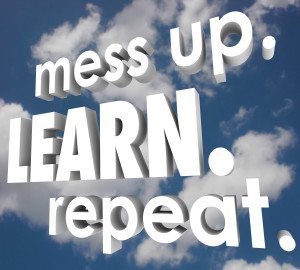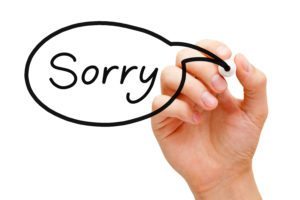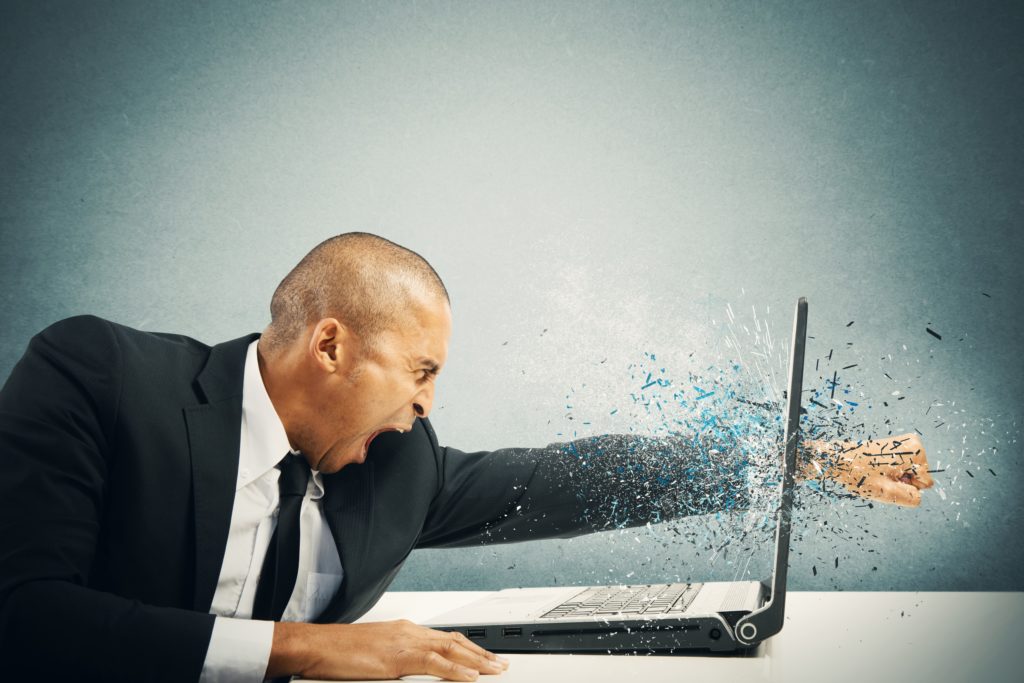“As long as the world is turning and spinning, we’re gonna be dizzy and we’re gonna make mistakes” — Mel Brooks
In bar disciplinary proceedings, the word “mistake” is often used either to explain, describe, or defend against, a charge of alleged unethical behavior. But is it unethical for an attorney to make an “honest mistake”? Ethical guidance on what seems to be a straightforward question is mixed. The New Jersey Office of Attorney Ethics, for example, states:
A mistake does not necessarily constitute unethical conduct. If a mistake causes a loss, the client may be able to recover the loss in a civil suit against the lawyer for money damages. But a simple mistake or error in judgment by itself is not unethical conduct.
Unfortunately, this statement raises more questions than answers. Indeed, that a “mistake” is not “necessarily” unethical implies that a “mistake” could, in fact, be unethical. The further attempt to classify a mistake as “simple” begs the question – what is a “simple” ethical mistake? And from whose vantage point. See our post “To err is Human–But is it Unethical” (here).
The word “mistake” and common variations (“simple mistake”, “honest mistake” or “stupid mistake”) arise with some degree of frequency in matters of attorney ethics and discipline. In the ethics and discipline context, the word “mistake” is typically used as a euphemism for more legally charged terms of art, such as negligence or incompetence.
No matter how one wants to characterize a lawyer’s error, the fact of the matter is that characterizing conduct as a “mistake”does not mean the conduct is free from the reach of disciplinary authorities. At least several ethics rules may be implicated by counsel’s “mistake.”
 Mistakes and Duty of Competence
Mistakes and Duty of Competence
The very first rule of ethics is the duty of a lawyer to “provide competent representation to a client.” See ABA Model Rule 1.1; USPTO Ethics Rule 37 C.F.R. Section 11.101. The rules provide that “Competent representation requires the legal knowledge, skill, thoroughness and preparation reasonably necessary for the representation.” While it is not necessarily obvious from the plain language of the rule itself, one could see that a “mistake” could fall within the scope of Model Rule 1.1 if the “mistake” was caused by an attorney’s lack of preparation, training, thoroughness or experience. As one ethics authority has noted, “Reasonable lawyers can make reasonable mistakes. The lawyer is not competent when the mistake is not reasonable, and she is competent if the mistake is reasonable.” R. Rotunda and J. Dzienkowski, Legal Ethics The Lawyer’s Deskbook on Professional Responsibility at 90(ABA Ctr. Prof. Resp. 2013).
One example of a “mistake” that can arise in the course of patent or trademark prosecution is the docketing error. As we reported in our post (here), an IP lawyer was suspended from the USPTO for five year in part because of his use of an antiquated docketing system. The result was that between 2005 and 2010, maintenance fees were not paid, leading to the abandonment of a number of client patents.
The attorney was disciplined for “neglect” pursuant to the provisions of the former USPTO Code of Professional Responsibility, 37 CFR Section 10.77(c). Under the present USPTO ethics rules, the attorney most likely would have been charged with violating the duty of competence, 37 CFR Section 11.101, which is the ethical rule most analogous to the former USPTO rule 37 CFR Section 10.77(c) proscribing “neglect.”
 Duty to Report “Mistakes” to Client
Duty to Report “Mistakes” to Client
Lawyers owe an ethical and fiduciary duty to their clients to report their own “mistakes” in the course of representation. The source of the duty can be found, for example, in ABA Model Rule 1.4 (USPTO Rule 37 CFR Section 11.104), which in relevant part requires an attorney to “promptly inform the client of any decision or circumstance” adversely affecting the representation, as well as to “keep the client reasonably informed about the status of the matter.”
Courts have found in the IP malpractice context that a lawyer may “have an obligation to advise his client about a possible malpractice claim” against the lawyer. See Encyclopedia Britannica, Inc. v. Dickstein Shapiro LLP, No. 10-0454 (D.D.C. Feb. 2, 2012). Such decisions are consistent with the lawyer’s ethical duty to “explain a matter to the extent reasonably necessary to permit the client to make informed decisions regarding the representation.” ABA Model Rule 1.4(b); 37 CFR Section 11.104(b).
Lawyers who want to understand the full scope of the ethical implications of their “mistakes” should read D. Dorsainvil, D. Richmond and J. Bonnie’s excellent article, “My Bad: Creating a Culture of Owning Up to Lawyer Missteps and Resisting the Temptation to Bury Professional Error” (ABA Lit. Sect. Apr. 16, 2015) (“My Bad“) (here). As the authors explain:
The rules of professional ethics and common law fiduciary obligations of a lawyer have been found to require lawyers to admit their mistakes under certain circumstances. Lawyers generally face the possibility of grave negative consequences if they fail to admit their mistakes when required. The consequences of concealing such mistakes are even more serious.
Id. at 2.
 Admitting or Failing to Admit Mistakes in Disciplinary Proceedings
Admitting or Failing to Admit Mistakes in Disciplinary Proceedings
Whether a lawyer admits, or fails to admit, a mistake can be relevant in determining an appropriate disciplinary sanction. Many bar counsel, including the USPTO’s Office of Enrollment and Discipline, refer to the ABA’s Standards for Imposing Lawyer Sanctions in determining the appropriate sanction for an ethics violation. The ABA has developed an analytical framework for assessing discipline, which requires consideration of four questions:
- What ethical duty did the lawyer violate?
- What was the lawyer’s mental state?
- What was the extent of the actual or potential injury caused by the lawyer’s misconduct?
- Are there aggravating or mitigating circumstances?
A lawyer’s ethical violation resulting from neglect or “mistake” would generally auger in favor of a lower disciplinary sanction under the first two disciplinary considerations.
In addition, if a lawyer fails to admit to their mistake, bar counsel could consider such a failure as a “refusal to acknowledge wrongful nature of conduct”, one of several different aggravating factors which could warrant a greater level of discipline. By contrast, a lawyer’s remorse is one of a number of mitigating factors that might warrant a downward departure from what otherwise might be a more severe sanction.
As discussed in “My Bad” (at 21):
a lawyer who fails to admit error may run afoul of the rules of professional conduct, thereby further subjecting the lawyer to professional discipline. A lawyer who continues to resist acknowledgment of error before the state disciplinary board is generally detrimental.
Where a member of the bar is charged with delinquencies . . . there is but one course open to him—to come forward frankly and make such truthful explanations as he may, and with equal frankness admit his mistakes. It does not profit him before this court to rely upon technical defenses or employ sophistry in argument in an attempt to establish a superficial justification.
Matter of Feinstein, 233 A.D. 541, 542-543, 253 N.Y.S. 455 (N.Y.A.D. 2 Dept. 1931)(ordering a one year suspension for a lawyer who was known to bully other lawyers, use aggressive litigation tactics, and present inappropriate excuses for his conduct).
Managing the “Human Error”
Professional liability insurer CNA recently explained that “the attorney’s management of the mistake is often more important than the mistake itself. Moreover, failure to appropriately address an error can exacerbate the simple malpractice situation and give rise to disciplinary grievances or other claims and increased damages. See “To Err is Human: A Guide for Attorneys on How to Manage Errors” at 2 (copy here)
The CNA report offers an excellent step-by-step process for evaluating and managing a lawyer’s error and even provides an error management “flow chart.” As the CNA report explains (at 3), once a lawyer or law firm realize the occurrence of an error, the following questions should be considered:
- Must the error be reported to the client?
- If so, when should the error be reported to the client?
- What should the attorney say when disclosing an error?
- How should the attorney disclose the error?
- Should the attorney discuss the possibility of a legal malpractice claim?
- Does the error require withdrawal from the representation?
In sum, all lawyers will make a mistake in their practice. How the lawyer responds to their mistake may be the difference between whether the lawyer will be subject to a malpractice claim and professional discipline, or not. Clients and bar counsel are human and they too have made mistakes in their professional life. Will appealing to their human side avoid a lawsuit or ethics charges? Not necessarily. That said, however, steps can be taken to lessen the blow. Owning the mistake, self-reporting the mistake, and doing everything humanly possible to fix or mitigate the mistake, are steps lawyers can take to mitigate the risk of potentially harsh civil or disciplinary consequences.

Well done post, Mike, if I am not mistaken.